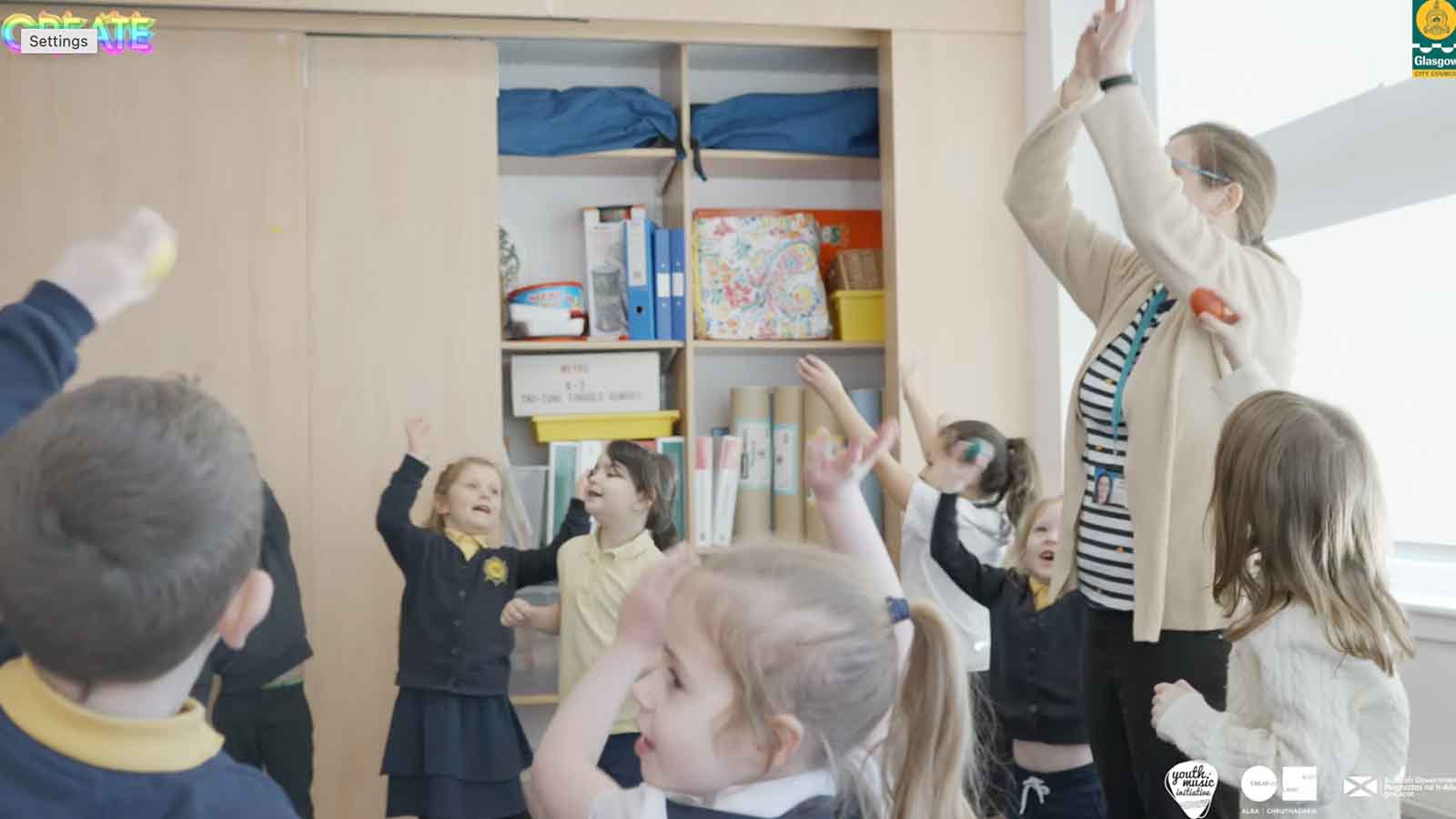Every month we shine a light on a different Youth Music Initiative activity to celebrate the wonderful work funded through this important Scottish Government-supported initiative. In this month's Spotlight, discover how Glasgow's YMI Formula Fund programme is supporting literacy and engagement in learning in its primary schools.

Martin O’Neill (Principal Instructor - Glasgow CREATE).
Glasgow’s YMI Formula Fund programme is breaking ground when it comes to supporting learners’ literacy and engagement in learning. Their YMI Tutors visit all Primary and Primary ASN (Additional Support Needs) Schools in the city each year and work with all P1 and many P2 pupils. Last year, the project reached 8,379 pupils, aiming to develop music and language skills.
Developing music and language skills in children is essential because both areas support cognitive and emotional growth. Music can help with pattern recognition, memory, rhythm and emotional expression; while language skills lay the foundation for communication, literacy and critical thinking. Children find that learning these skills are fun, engages their creativity and sense of play by allowing them to experiment with words and sounds. These opportunities at an early age can enhance their academic performance, build and develop social skills and encourage children to problem solve from a young age.
Pam Black, Education Support Officer – Instrumental Music, talks more about the impact of their programme:
Last academic year, we carried out some research in two of our primary schools, Camstradden Primary and Langside Primary, to measure the impact of our intervention at P1 level. Camstradden Primary School is located in area of socioeconomic deprivation where there are fewer opportunities for young people to get involved in the arts. Langside Primary is in the south of Glasgow and has a high percentage of pupils with English as an additional language (33%) and pupils with additional support needs (43%).
Each class received fortnightly music lessons from a YMI Tutor to develop the core music skills of beat, rhythm and pitch, through the use of voice and body percussion, along with an introduction to reading music notation and playing classroom percussion instruments. The lessons were designed to promote the development of music skills and phonological awareness, which research has shown leads to a positive impact on reading and literacy development:
“Active engagement with music plays a major role in developing aural perceptual processing systems which facilitate the encoding and decoding of speech sounds and patterns; the earlier the exposure and the greater length of participation the greater the impact. Transfer of these skills is automatic and there is now accumulating evidence that this contributes not only to language development but also to literacy.” Hallam, S. (2015) The Power of Music.
Activities which focused on the timbre of different musical instruments were used to promote auditory discrimination skills. A variety of singing games, rhyme and rhythm activities were used to develop sense of pulse and awareness of syllables in words. Flashcards and pictorial rhythm notation were used as a visual aids to promote sound symbol association, a skill that is crucial in both music and literacy learning.
Teachers continued to deliver the programme on the alternate weeks and were supported by YMI Tutors to develop their knowledge, skills and confidence in doing so through the provision of modelled lessons, CLPL and resources. In both schools, teachers carried out baseline phonological awareness assessments (using the Glasgow Dyslexia Support Service Phonological Awareness Tracker) with the children in August 2023.
Across both schools, 61% of children had gaps in phonological awareness upon starting school in August.
Phonological awareness refers to the ability to recognise and manipulate sounds in spoken language, blending sounds, understanding syllables and rhyming patterns. It is a foundational skill for reading and writing because it helps children connect with sounds and understand written and spoken language. Without a strong grasp on phonological awareness, children may struggle with basic literacy tasks which can then lead to difficulties when learning to read and write.
In June, this had reduced to 19%, with most (81%) children now on track with their progress at Early Level.
In the repeat phonological awareness assessment, the average score increased by 52%, with children demonstrating improvements in the areas of Listening, Rhyme Awareness, Syllabic Awareness and Phonemic Awareness.
"Having a professional musician who understands the complex special needs of each individual learner has a huge positive impact on our learners engagement, self regulation, enjoyment and focus." - Teacher
One of the key achievements we found was that the YMI music sessions, alongside the school literacy programme, were particularly effective in raising attainment for the children from a range of backgrounds and, in particular, for children with barriers to learning including poverty, English as an additional language, or additional support needs.
Through participation, the children had improved engagement, rhyme and syllabic awareness, listening skills, working memory and readiness to learn. Particular impact was noted for groups of children with English as an additional language and children who lacked phonological awareness at the start of the year.
On reflection, music is particularly impactful for children whose first language isn’t English because it provides a fun, non-verbal way to develop language skills. Songs with repetition and simple vocabulary help children learn new words and sounds in English, while improving listening and pronunciation. Music also builds confidence and creates a positive, engaging environment for language learning all while being fun for children.
Find out more about Glasgow’s YMI Formula Fund programme at www.glasgowcreate.online.
